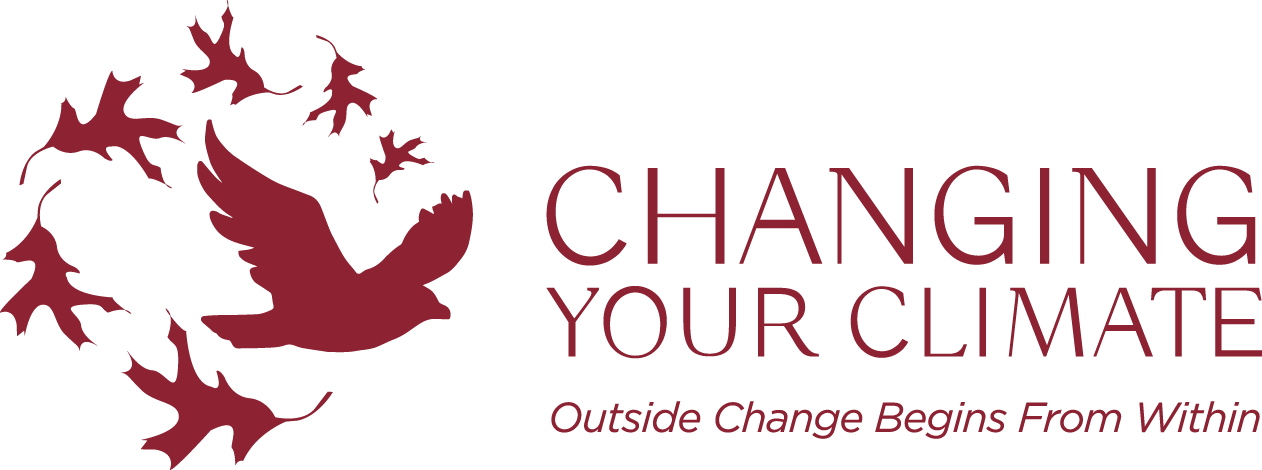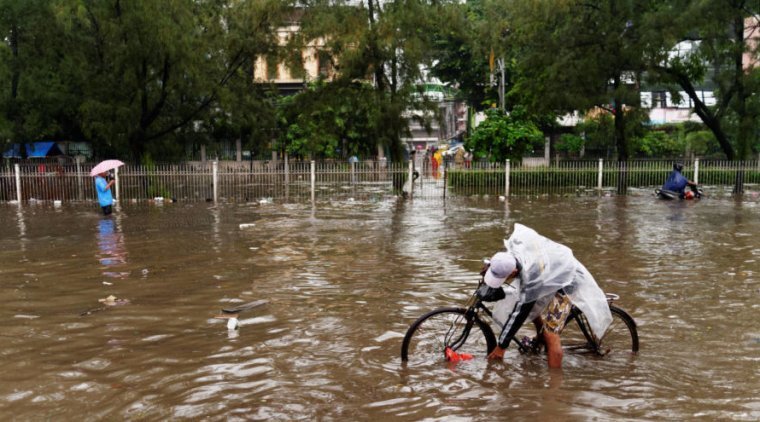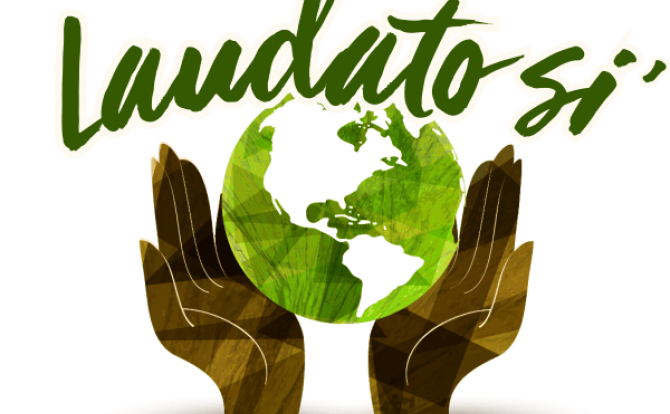This is a guest post from Luke Henkel, a new friend who lives in Seattle. When he shared his writing with me last week, it resonated strongly, reminding me of related thoughts I’d been having about the correlation between the virus and climate change. I thought you might enjoy it as well…
It’s safe to say we’re all feeling a little unsafe lately.
Life Care Center at "coronavirus ground zero": Cleaners scan the scene of the epicenter of the Covid-19 outbreak in the United States in Kirkland.
The coronavirus has taken over everything. It seems like we can’t do anything but watch the statistics grow and wonder wearily what will happen next. Downtown Seattle, the “epicenter” of the outbreak in the US, is eerily empty. Metro buses have half the ridership, and events are being cancelled one after the other in a weird societal Domino effect. Most disconcerting of all, Google traffic shows green on I-5 at 5:00PM—in both directions.
All of our routines are a little disrupted. Some of our kids’ schools are already cancelled for weeks, and major universities are scrambling to try and shift massive numbers of classes and students to online platforms. Can we go to our normal restaurants, or should we opt for the drive-thru in the safety of our cars? Or, do we simply get delivery? Are the libraries safe? Can we go shopping, even for basics?
It’s also safe to say “business as usual” does not apply right now. For some, there is no business at all as fear notches higher and higher, like a tireless mountain climber spiking his way into the heights of anxiety.
And it’s so hard. On Monday, March 9, the stock market opened to its worst day in over ten years. Airlines are fearing billions in lost profit and planes are flying nearly empty. The economy is grinding and lurching to its slowest numbers in over a decade, and the shocks may reverberate for the rest of the decade. It’s horrifying.
We’re all saying, let’s just get back to business as usual.
My suggestion? Be even more horrified about business as usual in the first place.
Now, I want to be very clear about this. I am in no way suggesting that this coronavirus is good for us. Absolutely not. I am suggesting there is plenty to learn from our current circumstances, as bizarre and unsettling as they may be—and even more lessons to be gleaned from reflecting on what “business as usual” means to begin with.
We began Lent just a few days prior to the first confirmed fatality right here in King County. Lent is normally a time for us to slow down. It’s a chance for many of us to take an extra moment or two throughout our day to find God, to grow in our relationships and deepen our sense of the sacred at work all around us.
Did that happen?
Perhaps. Maybe you’ve been very intentional about taking extra prayer time or adding a few good deeds into your day.
Or maybe not. Business as usual is such an overwhelmingly powerful force—the inertia of our daily lives is so strong—it’s akin to the spinning of this planet. We don’t even notice it. We’re hurtling along at thousands of miles an hour, yet we’re not going fast enough! Our momentum feels so often like stillness, so we just rush onwards with ever greater freneticism.
And then along comes something that’s truly beyond us. It disrupts our inertia like very few other things can, and guess what? It’s not quite mass panic, but it feels pretty darn close. It’s scary, because so many of us don’t know what will happen next.
But here’s the thing. Business as usual is much, much scarier.
Jakarta has long been famous for its horrifying traffic and population density, but now a bigger problem is the ground it is losing - in many places of the megalopolis, the ground is sinking 3 to 10 centimeters per year. By 2050, more than one third of the city could be entirely submerged and uninhabitable.
Let me give you some examples. While all this coronavirus news is raging on, the capital city of Indonesia is moving. Did you know that? Jakarta, the current capital of over 10 million, is sinking. Groundwater is being extracted too fast, and parts of the mega-city are subsiding by up to 20 centimeters every year. At the same time, sea levels are rising, so much that plans for a seawall to protect the area from the worst of the flooding couldn’t possibly be executed fast enough. The government is planning to relocate its administration and build an entirely new city on the northern Indonesian island of Borneo. They are slated to finish the design for this new “smart city” by 2025 and begin relocating later this decade. This new capital will be built following the principles of the jungle, and will be the most advanced city ever constructed.
Now Borneo, mind you, is one of the most biodiverse regions in Southeast Asia and home to the critically endangered Sumatran orangutan as well as dozens of other endemic species like the clouded leopard and the Indonesian pygmy elephant (also at risk of extinction). It has also lost more than half of its virgin rainforests to oil palm plantations—since 1980. This city would be developed on over 600,000 acres of that rainforest. Relocation could wipe out all but the remaining fifth of the forest.
This is business as usual on our changing planet.
Closer to home, southern resident orca whales are at the critically low population of 76. Salmon populations are also dropping to alarmingly low rates. This is orcas’ food source of course, but warming and acidifying waters, as well as pollution, are affecting where and when they can find these salmon. The whales’ normal migratory paths are changing. This would be similar to your route home changing or disappearing altogether, with every single trip you took. On top of it all, increasing noise pollution from both recreational and commercial boat traffic in our busier waterways is interfering with the orcas’ ability to locate these dwindling schools; they are stressed and starving.
This is business as usual.
I could go on and on. Europe is just ending its warmest winter on record, during which officials carted fake snow up to Moscow for a white Christmas, and the entire German harvest of ice wine failed for the first time because there was no ice. These winemakers in Germany are now facing fears of another failed crop in 2020 because of—you guessed it—business as usual.
The point is, we are hearing nonstop about the coronavirus, and we’re all scared about its potential destructive swath through our communities.
But what about business as usual? Are we not feeling a similar wrenching, and equally strong heart palpitations when we think about these increasingly common stories? Are we not as concerned about returning to the horrific destructiveness of our daily inertia?
Here’s the thing, my friends. It doesn’t have to be that way.
I’m Catholic, and my social teaching tells me that those in Indonesia having to relocate because of climate change are our brothers and sisters. In his groundbreaking 2015 encyclical on the environment, Laudato Si’, Pope Francis tells us that these soon-to-be refugees are us. “Everything is interrelated” (LS 120) and we—in fact all creatures—are connected (LS 42). Their world is not separate from our world.
Now. I want to be very clear. I do not wish harm on anyone from this virus, and I’m as slack-jawed as anyone else at how quickly it’s spreading. I’d love these fears to go away.
But guess what? Right now, we all have a glorious opportunity. The inertia is disrupted, and we have no choice but to slow down. For the first time since climate change became such a devastating reality, we can stop what we’re doing, and listen. This is a global stillness that matters.
We have the chance to hear the cry of the earth and the cry of the poor with a bit more clarity, and to respond. So, let me ask you. How attentively are you heeding the public officials’ notices right now? How quickly are safe measures being enacted to care for our well-being? That’s how sharply we should be listening to the cry of the planet and those who are most vulnerable. And, that’s how diligently we should be responding.
Luke Henkel serves as the social outreach and advocacy assistant at St James Cathedral in Seattle. Luke is most active educating others on climate change, integral ecology, ecobricks as a form of reducing plastic pollution, and Catholic social and environmental teachings. He is currently pursuing his MA in theology and ecology through the School of Theology and Ministry at Seattle University.






